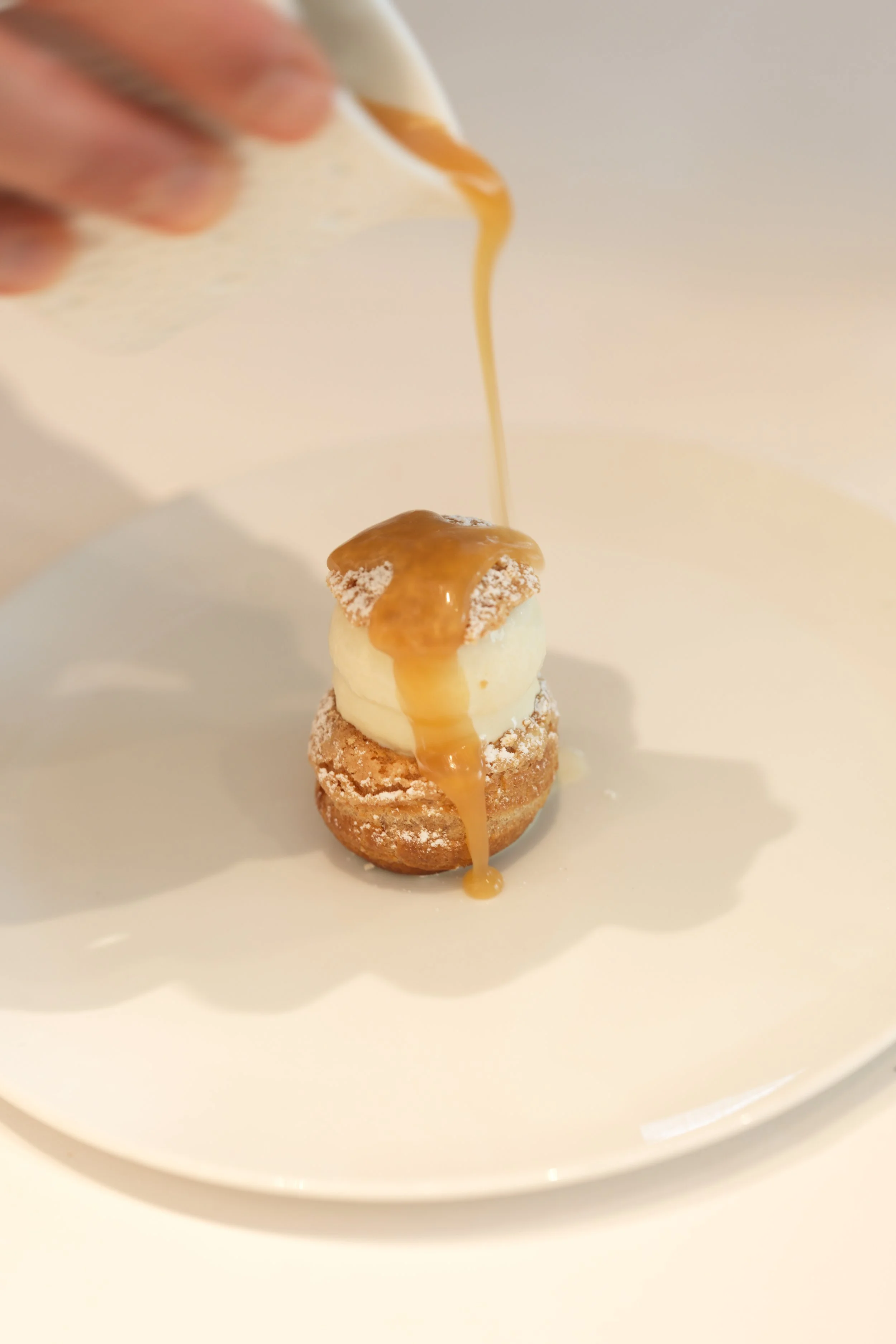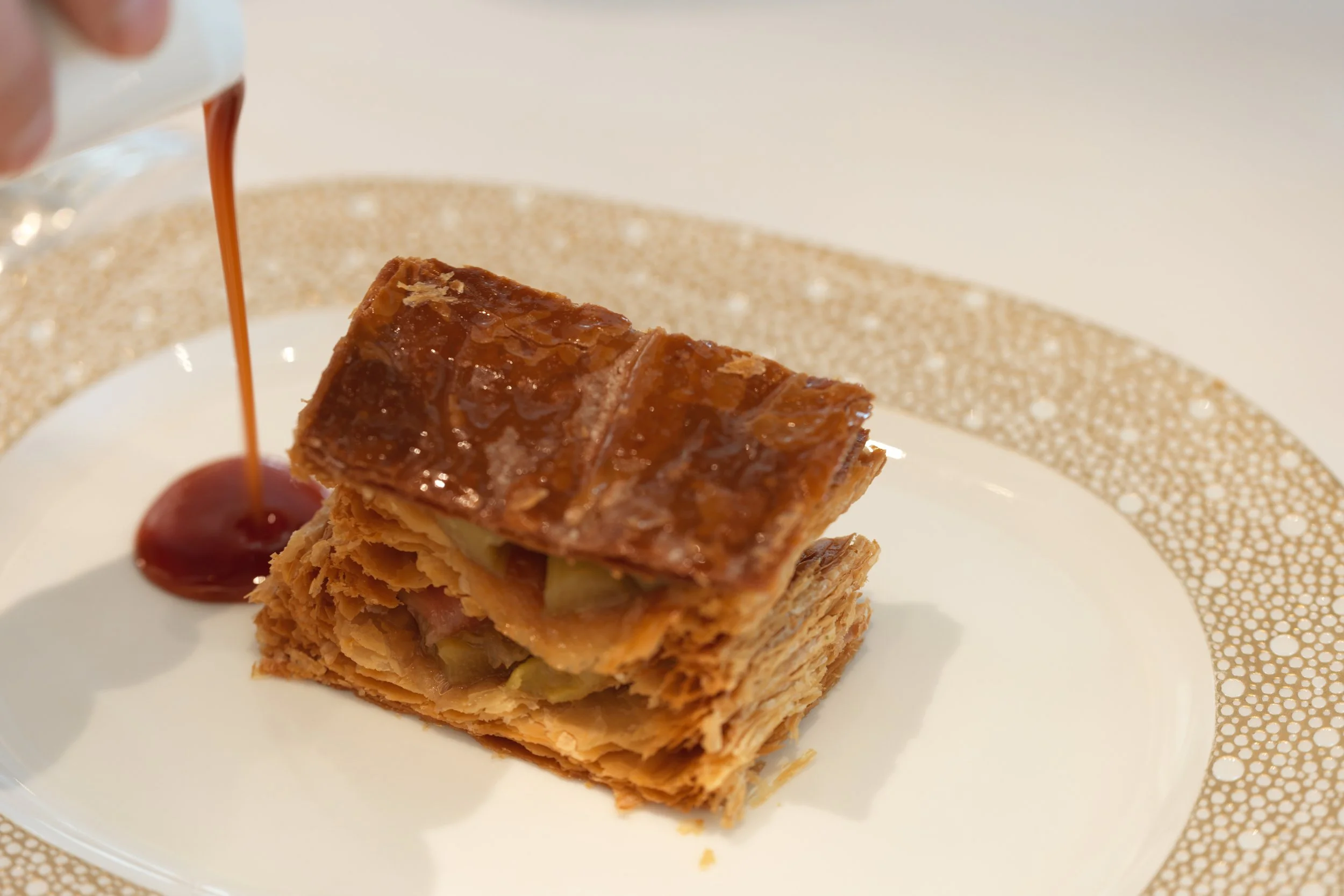Arpege
After spending a week in Paris without indulging in any fine dining experiences, my four-hour vegetarian feast at Arpege left me physically revitalized and mentally at peace, as though I had undergone a refreshing rebirth.
On a clear, pleasantly warm late March day in the City of Lights, clad comfortably in soft baby cashmere, I exited the restaurant feeling weightless. A gentle breeze welcomed me, accompanied by the playful dance of dappled shadows from the trees and the distant, dreamy outline of towering structures. With no urgency to hurry, I leisurely made my way back to the Champs-Élysées, savoring every step of the journey.
Arpege, the world's best vegetarian restaurant, shines particularly bright amidst Paris's enchanting springtime. It boasts the best ingredients and culinary genius. Its genius lies in the fact that "one can instantly tell it's superior to others, yet struggle to pinpoint precisely why."
Chef Alain Passard, a true culinary genius, hails from a lineage of artisans. Geniuses are easily recognizable, often by their demeanor. "Attitude is crucial; the respect you show towards your ingredients determines the final outcome." I couldn't agree more.
Chef Mr. Passard, now 68, still stands firm in his kitchen. In my view, his talent surpasses that of more famous chefs like Joël Robuchon, Alain Ducasse, and Pierre Gagnaire—who are known for their chains and apprenticeship—none of whose establishments currently satisfy me. Yet, Chef Mr. Passard has spent decades nurturing this small restaurant and its gardens.
Chef Mr. Passard entered the kitchen at 14, opened Arpege at 30, and earned three Michelin stars by 40. He has remained at this original location for 30 years, refusing to expand, franchise, or indulge in the limelight, maintaining family operation, and avoiding stagnation despite his accolades, still offering concise menus and timeless dishes.
"During my twenties, working under Alain Senderens, he once told me that I would eventually own this restaurant and achieve three Michelin stars. When I turned thirty, Senderens sold the property, so I acquired it," which might explain Arpege's steadfast refusal to relocate.
As I age, I increasingly revere time. "Life is a slow process of being hammered." Consistency for months is easy; for decades, it's not. Ideals in one's twenties come effortlessly; in one's sixties, they're a rarity.
In today's era, it's simple for someone without innate talent or professional kitchen training, packaged by media platforms like Redbook, to momentarily become a "celebrity chef" or a "culinary prodigy." But one cannot deceive everyone across all eras.
Among Paris's constellation of three-Michelin-starred restaurants, Chef Mr. Passard commands my utmost reverence. I admire his decades-long commitment to his original vision, his reduction of ambition, his reverence for life.
Upon entering, it feels like stepping into Dior's Provençal restaurant. Abundant wood and bamboo textures, even the ceiling is wooden. No music plays inside, with embroidered walls depicting rural scenes and orchards. The front room, less than 200 square meters, houses 14 tables winding in a somewhat cramped yet cozy layout, akin to a relaxed family eatery. The servers' attire is charming, a brown three-piece uniform that exudes comfort and elegance, harmonizing with the wooden tones and echoing Dior's aesthetic.
On my table sat a vibrant green cabbage, initially mistaken for a decoration, but upon closer inspection, I noticed dewdrops clinging to its leaves.
The real bottleneck for fine dining vegetarian restaurants in China lies in the ingredients, and Arpege indeed possesses the finest.
Those who detest certain foods know best whether they're good. As someone who abhors dark green vegetables (“super taster”), I found myself devouring a large bowl of leafy greens here without a hint of bitterness or fibrous texture, nor the pretentiousness often found in "vegetable salads" at other three-starred Michelin venues.
I finally grasped what constitutes the "best quality" in vegetables—indeed, it stems from the family-owned farms and gardens in northwest France, where all vegetables are cultivated and delivered fresh daily by train.
Two amuse-bouches were served with a small glass of green juice based on apple juice. I also ordered a bottle of clear kombucha, which smelled intensely herbal and tasted like a mix of Sprite and 7-Up.
The first course, Raw radish salad, an array of radish varieties accompanied by a tiny cauliflower and beetroot tartare at the center.
The second course, Molecular egg dish. Having tasted this over a dozen times, including at another Parisian three-star L'Ambroisie, Arpege's version instantly surpassed L'Ambroisie's. Soft-boiled egg with cheese and chives, the cut not perfectly neat but delivering a rich, creamy mouthfeel, with warm yolks and room temperature whites, served with a savory vegetable-stuffed bread.
Bread service followed, sourdough with salted butter. The menu began after the bread.
The third course, Vegetable dumplings. The dumpling soup was incredibly potent, distinguished by an indescribable difference that made it stand out. The broth was clear, and the cabbage-filled dumplings were particularly unique, appearing deceptively simple yet bursting with an unexpected richness, smoothness, and juiciness, not typical of cabbage, with some beans included, and refreshingly sans cheese. The MVP of the evening.
The fourth course, Vegetable salad. Filled with greens and cheese shreds I typically dislike, yet I finished it all, with the greens completely devoid of bitterness.
The fifth course, Vegetable sushi. A large hand roll with rice seasoned with soy sauce and olive oil, topped with yellow beet resembling yuzu-citrus flavors, French mustard swirled on the plate as a sauce. A deconstruction of Japanese sushi.
The sixth course, Country vegetable terrine. Resembling a meat pie in appearance and taste, but instead of meat jelly, it used a gelatin eerily close to meat, served with a large bowl of fresh, tender greens, free of any fibrous texture, exceedingly sweet and tender, evoking a sense of infancy.
The seventh course, Cauliflower soup. Another outstanding soup. Creamy cauliflower soup, enriched with a dollop of smoked cream upon serving, tasting as comforting as corn without the usual cheese overtone.
The eighth course, Spinach. High-quality spinach paired with passion fruit sauce.
The ninth course, Mock beef tartare. A mock beef tartare using genuine beetroot, mimicking the shape of a beef tartare, served with a spicy mayonnaise.
The tenth course, Vegetable caramelized onion salad. Honey and lemon dressing, combined with cooked radishes and greens, a reinterpretation of the earlier raw vegetable salad.
The eleventh course, Ice cream puff. Vanilla milk ice cream, mild in flavor, paired with airy choux pastry drizzled with honey. The puff was airy, slightly crisp, and stood tall, a common dessert executed distinctively.
The last course, Mille-feuille. Exceptionally crispy puff pastry, filled with pickled rhubarb, tangy and sweet.
As previously noted, Arpege's culinary offerings possess a certain intangible quality; they convey an immediate sense of superiority that's hard to pinpoint. It just feels "real" and pure, like they don't use fancy tricks or showy cooking styles. You might think the great taste comes only from using top-notch ingredients, but it's not that simple . Everything is so perfectly balanced and tasty, with each subtle seasoning nuance artfully highlighting the meticulous craftsmanship that coexists harmoniously with nature's bounty.
Such is the mark of a true culinary genius.







